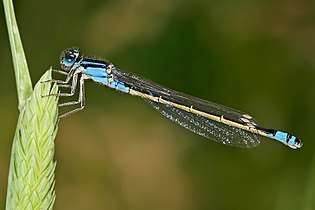Ischnura
Ischnura is a genus of damselflies known as forktails in the family Coenagrionidae.[2] Forktails are distributed worldwide, including various oceanic islands. The males have a forked projection at the tip of the abdomen which gives the group their common name.[3]
| Ischnura | |
|---|---|
 | |
| Ischnura heterosticta | |
| Scientific classification | |
| Kingdom: | Animalia |
| Phylum: | Arthropoda |
| Class: | Insecta |
| Order: | Odonata |
| Suborder: | Zygoptera |
| Family: | Coenagrionidae |
| Genus: | Ischnura Charpentier, 1840[1] |
Characteristics
Forktails are small or very small damselflies. The compound eyes of mature individuals have a dark upper region and contrasting lower part. The thorax is often green and may have lateral stripes and the abdomen in males is black with a blue tip. Females of some species are polymorphic, some being orangish and darkening with age, while others resemble the male.[3]
Species
The genus Ischnura includes the following species:[4][5]
- Ischnura abyssinica Martin, 1908
- Ischnura acuticauda Lieftinck, 1959
- Ischnura albistigma Fraser, 1927
- Ischnura aralensis Haritonov, 1979
- Ischnura ariel Lieftinck, 1949
- Ischnura asiatica (Brauer, 1865) – Redtail[6]
- Ischnura aurora Brauer, 1865 – Aurora Bluetail[6]
- Ischnura barberi Currie, 1903 – Desert Forktail[7]
- Ischnura buxtoni Fraser, 1927
- Ischnura capreolus (Hagen, 1861)
- Ischnura cardinalis Kimmins, 1929
- Ischnura cervula Selys, 1876 – Pacific Forktail[7]
- Ischnura chingaza Realpe, 2010
- Ischnura chromostigma Fraser, 1927
- Ischnura cruzi De Marmels, 1987
- Ischnura cyane Realpe, 2010
- Ischnura damula Calvert, 1902 – Plains Forktail[8]
- Ischnura demorsa (Hagen, 1861) – Mexican Forktail[8]
- Ischnura denticollis (Burmeister, 1839) – Black-fronted Forktail[7][9]
- Ischnura dorothea Fraser, 1924
- Ischnura elegans (vanderLinden, 1823) – Blue-tailed Damselfly[10]
- Ischnura erratica Calvert, 1895 – Swift Forktail[7]
- Ischnura evansi Morton, 1919 – Blue-banded Damsel
- Ischnura filosa Schmidt, 1951
- Ischnura fluviatilis Selys, 1876
- Ischnura forcipata Morton, 1907
- Ischnura fountaineae Morton, 1905 – Oasis Bluetail[11]
- Ischnura gemina (Kennedy, 1917) – San Francisco Forktail[7]
- Ischnura genei (Rambur, 1842) – Island Bluetail[11]
- Ischnura graellsii (Rambur, 1842) – Iberian Bluetail[11]
- Ischnura haemastigma Fraser, 1927
- Ischnura hastata (Say, 1839) – Citrine Forktail[7]
- Ischnura heterosticta (Burmeister, 1839) – Common Bluetail[6]
- Ischnura inarmata Calvert, 1898
- Ischnura indivisa (Ris, 1918)
- Ischnura intermedia Dumont 1974
- Ischnura isoetes Lieftinck, 1949
- Ischnura karafutonis Matsumura, 1931
- Ischnura kellicotti Williamson, 1898 – Lilypad Forktail[12]
- Ischnura luta Polhemus, Asquith & Miller, 2000
- Ischnura ordosi Bartenev, 1912
- Ischnura pamelae Vick & Davies, 1988
- Ischnura perparva Selys, 1876 – Western Forktail[7][12]
- Ischnura posita (Hagen, 1861) – Fragile Forktail[9][12][12]
- Ischnura prognata (Hagen, 1861) – Furtive Forktail[12]
- Ischnura pruinescens (Tillyard, 1906) – Colourful Bluetail[6]
- Ischnura pumilio (Charpentier, 1825) – Small Bluetail or Scarce Blue-tailed Damselfly[10]
- Ischnura ramburii (Selys, 1850) – Rambur's Forktail[7]
- Ischnura rhodosoma Lieftinck, 1959
- Ischnura rubella Navás, 1934
- Ischnura rufostigma Selys, 1876
- Ischnura rufovittata (Blanchard, 1843)
- Ischnura saharensis Aguesse, 1958 – Sahara Bluetail[13]
- Ischnura sanguinostigma Fraser, 1953
- Ischnura senegalensis (Rambur, 1842) – Marsh Bluetail[14]
- Ischnura spinicauda Brauer, 1865
- Ischnura stueberi Lieftinck, 1932
- Ischnura taitensis Selys, 1876
- Ischnura thelmae Lieftinck, 1966
- Ischnura ultima Ris, 1908
- Ischnura verticalis (Say, 1839) – Eastern Forktail[9][12]
- Ischnura vinsoni Fraser, 1949
gollark: So you admit it.
gollark: ForthLisp™.
gollark: Besides, the A53 cores in my Raspberry Pi 3B™ are much more powerful than this "M1".
gollark: I think you can still buy a few of them.
gollark: Arbitrary CPUs can and will be compared, bee.
References
| Wikimedia Commons has media related to Ischnura. |
| Wikispecies has information related to Ischnura |
- Charpentier, T. (1840). Libellulinae Europaeae Descriptae et Depictae (in Latin). Leipzig: Leopold Voss. pp. 180 [20]. hdl:2027/nyp.33433011575317.
- "Genus Ischnura Charpentier, 1840". Australian Faunal Directory. Australian Biological Resources Study. 2012. Retrieved 3 April 2017.
- Paulson, Dennis (2009). Dragonflies and Damselflies of the West. Princeton University Press. p. 107. ISBN 978-1-4008-3294-1.
- Martin Schorr; Dennis Paulson. "World Odonata List". University of Puget Sound. Retrieved 12 Oct 2018.
- "Odonata species list". Swedish Museum of Natural History. Retrieved 11 August 2010.
- Günther Theischinger; John Hawking (2006). The complete field guide to dragonflies of Australia. CSIRO Publishing. ISBN 0-643-09073-8.
- "California Damselflies". Dragonflies (Odonata) of the Southwest. Archived from the original on 2009-09-23.
- "Species List: Damselflies". azdragonfly.net. Archived from the original on 2011-07-21. Retrieved 2010-08-13.
- Abbott, John (2008). Dragonflies and Damselflies (Odonata) of Texas, Vol 3. Odonata Survey of Texas. ISBN 978-0-615-19494-3.
- "Checklist of UK Species". British Dragonfly Society. Retrieved 5 August 2010.
- "Checklist, English common names". DragonflyPix.com. Archived from the original on 4 December 2012. Retrieved 5 August 2010.
- "North American Odonata". University of Puget Sound. 2009. Retrieved 5 August 2010.
- Samraoui, B. & Dijkstra, K.-D.B. (2010). "Ischnura saharensis". IUCN Red List of Threatened Species. 2010: e.T165477A6031236. doi:10.2305/IUCN.UK.2010-3.RLTS.T165477A6031236.en. Retrieved 24 December 2017.
- "Ischnura senegalensis". IUCN Red List. Retrieved 5 August 2010.
This article is issued from Wikipedia. The text is licensed under Creative Commons - Attribution - Sharealike. Additional terms may apply for the media files.